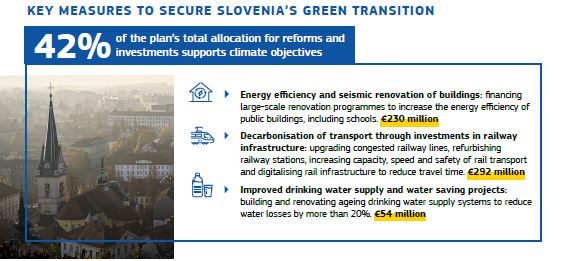The European Commission disbursed on 17 September 2021 EUR 231 million to Slovenia in pre-financing, equivalent to 13% of the country’s grant allocation under the Recovery and Resilience Facility (RRF). The pre-financing payment will help to kick-start the implementation of the crucial investment and reform measures outlined in Slovenia’s recovery and resilience plan.
The country is set to receive EUR 2.5 billion in total, consisting of EUR 1.8 billion in grants and EUR 705 million in loans, over the lifetime of its plan.
The European Commission adopted on 1 July 2021 a positive assessment of Slovenia’s recovery and resilience plan. The Council of the EU confirmed the assessment at the virtual meeting of the EU finance ministers on 26 July 21021 and the official adoption was declared on 28 July 2021.
The Slovenian plan’s contribution to the green transition amounts to 42% of its total allocation of EUR 2.5 billion. This exceeds the minimum of 37% required by the RRF Regulation. The plan includes reforms related to renewable energy and sustainable mobility to support the decarbonisation of the energy and transport sectors. The largest contributions to the climate targets are provided by measures for adaptation to climate change – for instance in the area of flood prevention –, by measures to promote renewables and energy efficiency of public buildings and upgrading of rail infrastructure. Some measures also enhance biodiversity, for example through better forest management or by promoting nature-based solutions for climate change adaptation.
The Commission finds that the Slovenia’s plan devotes 21% of its total allocation to measures that support the digital transition. These include efforts to digitalise the public administration, investments in connectivity and digital skills and for the digitalisation of businesses.
The assessment also finds that none of the measures included in the plan significantly harm the environment, in line with the requirements laid out in the RRF Regulation.
The Government of the Republic of Slovenia approved on 23 September 2021 a proposal for an amendment to the Budget Execution Act for 2021 and 2022, as the aim of the amendment is to provide appropriate legal bases for efficient use of European funds for projects included in the national Recovery and Resilience Plan.
***
EUR 4 billion of green investments planned by the EICS members
The Energy Industry Chamber of Commerce conducted an analysis in relation to the green energy investment projects of the EICS’s members at the end of 2020 / beginning 2021. The analysis revealed the following:
| Total value of all planned investments in the financial perspective 2021-2027: | EUR 3.98 billion |
| Total value of all ready-to-go investments in the initial period 2021-2024: | EUR 1.56 billion |
We also analysed the areas of future investments in the energy sector. Companies have been able to select several areas of the energy transition in which they are expected to invest. The results are as follows:
- Strengthening the green EU is at the forefront, as 70% of companies plan such investments, which can be defined as environmentally or climate-friendly.
- More than half of the respondents (56%) plan to invest in new technologies.
- Half of the companies (48%) will invest in digital transformation.
- Almost half of the companies (44%) also plan various pilot projects.
- 41% of companies are announcing new products / business models.
- Ten companies (37%) will invest in areas that will bring new jobs.
- More than fifth (22%) of the respondents plan projects under the so called Circular Economy Commitment.
- Other areas (11%): more robust electricity network, extension of NEK lifetime, investment in production reliability…
More specifically, the analysis showed that 70% of companies are preparing projects in the field of renewable energy sources (RES) and 60% in the field of smart grids.
More than half (56%) will invest in reducing greenhouse gas emissions (introduction of low-carbon technologies). Almost half (44%) plan investments in the field of energy efficiency and e-mobility. Some companies (22%) also plan to invest in smart communities.
As Slovenia will benefit from the significant amount of EU funds – more than EUR 10 billion by 2027, the EICS emphasizes that it is important that this money is used for “smart” projects that will enable not only the country’s recovery from the COVID-19 pandemic, but will also enable a breakthrough into a green, digital and resilient society and economy.
Our Chamber also wants to show that there is an array of green energy projects envisaged by the Slovenian energy companies which should definitively be considered as eligible projects of the green transition. It will be especially important that the projects are ready as soon as possible, as the implementation of many projects will take several years. The Government of the Republic of Slovenia and all relevant ministries have been informed about the abovementioned analysis.
*****
Energy Transition and European Funds Group
Our Chamber has set up a dedicated Energy Transition and European Funds Group in December 2020. The Group has been in contact with the competent institutions responsible for EU funds. Thus, the members of the EICS have been informed about the about the programmes and upcoming tenders that the Slovenian energy companies could benefit from. On the other hand, Slovenian relevant authorities have been informed about the projects being prepared on the ground.
The Energy Transition and European Funds Group started work on 15 January 2021. It succeeded in increasing the amount of support for the renewables and energy efficiency in the national Recovery and Resilience Plan, and ensuring support for the electricity distribution network upgrade.
The Slovenian plan’s contribution to the green transition amounts to 42% of its total allocation of EUR 2.5 billion.

*****
For More Information:
- Factsheet: Slovenia’s recovery and resilience plan
- NextGenerationEU: European Commission endorses Slovenia’s €2.5 billion recovery and resilience plan (1 July 2021)
- Questions and answers: European Commission endorses Slovenia’s €2.5 billion recovery and resilience plan
- Press release with the accompanying documents
- NextGenerationEU: European Commission disburses €231 million in pre-financing to Slovenia (17 September 2021)
- Slovenian Recovery and Resilience Plan
- Analysis of EICS: EUR 4 billion of green investments planned by the EICS members

